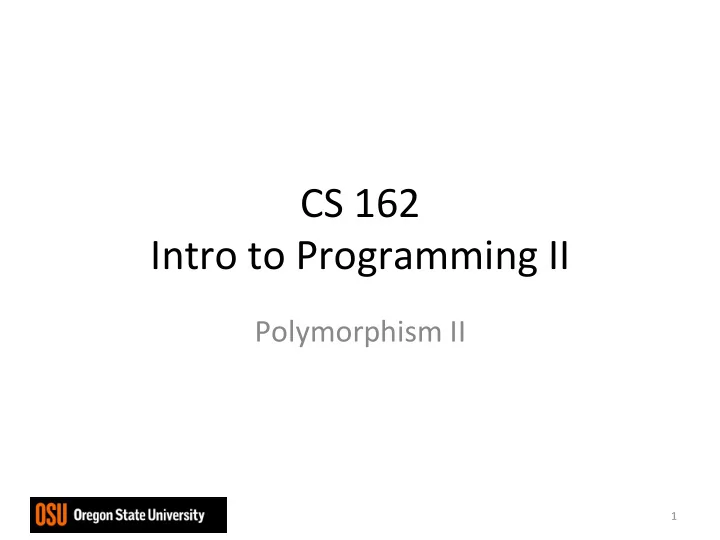

CS ¡162 ¡ Intro ¡to ¡Programming ¡II ¡ Polymorphism ¡II ¡ 1 ¡
Virtual ¡Func:ons ¡ • Which ¡is ¡which, ¡for ¡changing ¡the ¡behavior ¡of ¡ inherited ¡func:ons? ¡ ¡ ¡ – Overriding ¡refers ¡to ¡doing ¡this ¡change ¡to ¡a ¡virtual ¡ func:on ¡ – Redefining ¡refers ¡to ¡doing ¡this ¡change ¡to ¡a ¡non-‑ virtual ¡func:on ¡ – Overloading ¡refers ¡to ¡the ¡defini:on ¡of ¡different ¡ func:ons ¡within ¡the ¡same ¡class ¡with ¡the ¡same ¡ name ¡and ¡different ¡ ¡parameter ¡lists. ¡ 2 ¡
Abstract ¡Classes ¡ /* Shape.hpp */ class Shape { public: Shape(); virtual void print() = 0; virtual double getArea() = 0; }; /* Shape.cpp */ Shape::Shape() { } 3 ¡
Abstract ¡Classes ¡ /* Shape.hpp */ class Shape { public: Shape(); virtual void print() = 0; virtual double getArea() = 0; }; ¡ • These ¡are ¡pure ¡virtual ¡func:ons ¡ ¡ ¡ • Cannot ¡create ¡a ¡shape ¡object-‑ ¡abstract ¡class ¡ 4 ¡
Abstract ¡Classes ¡ • Why ¡abstract ¡classes? ¡ ¡ ¡ – It ¡has ¡the ¡common ¡characteris:cs ¡ ¡ – Details ¡are ¡leP ¡to ¡specific ¡subclasses ¡ ¡ – In ¡this ¡case ¡we ¡want ¡each ¡shape ¡to ¡draw ¡itself ¡and ¡ compute ¡its ¡area ¡ ¡ – Details ¡will ¡vary ¡for ¡each ¡shape ¡ ¡ – You ¡do ¡not ¡even ¡need ¡to ¡know ¡what ¡shapes ¡may ¡ be ¡used ¡later! ¡ ¡ ¡ 5 ¡
Abstract ¡Classes ¡ • A ¡derived ¡class ¡will ¡also ¡be ¡abstract ¡unless ¡you: ¡ ¡ 1. You ¡provide ¡defini:ons ¡for ¡the ¡inherited ¡pure ¡virtual ¡ func:ons ¡ 2. You ¡do ¡not ¡add ¡any ¡pure ¡virtual ¡func:ons ¡ • If ¡ ¡these ¡condi:ons ¡are ¡met ¡you ¡can ¡create ¡an ¡ object ¡of ¡the ¡derived ¡class ¡ ¡ 6 ¡
Abstract ¡Classes ¡ • How ¡does ¡this ¡work? ¡ ¡ ¡ • We ¡will ¡create ¡a ¡derived ¡class ¡for ¡a ¡Rectangle ¡ and ¡a ¡Triangle ¡ • Both ¡will ¡define ¡the ¡pure ¡virtural ¡func:ons ¡ ¡ • Both ¡will ¡add ¡member ¡variables ¡and ¡func:ons ¡ (but ¡no ¡pure ¡virtual ¡func:ons) ¡ ¡ ¡ 7 ¡
Abstract ¡Classes ¡ /* Rectangle.hpp */ class Rectangle : public Shape { public: Rectangle(double height, double width); void print(); double getArea(); private: double height; double width; }; 8 ¡
Abstract ¡Classes ¡ /* Inside Rectangle.cpp. Constructor omitted due of lack of space */ void Rectangle::print() { for( int i = 0; i < height; i++ ) { for( int j = 0; j < width; j++ ) { std::cout << "*"; } std::cout << std::endl; } } double Rectangle::getArea() { return (height*width); } 9 ¡
Abstract ¡Classes ¡ /* Triangle.hpp */ class Rectangle : public Shape { public: Triangle(double height, double width); void print(); double getArea(); private: double height; double width; }; 10 ¡
Abstract ¡Classes ¡ /* Inside Triangle.cpp. Constructor omitted due of lack of space */ void Triangle::print() { for( int i = 0; i < height; i++ ) { for( int j = 0; j <= i; j++ ) { std::cout << "*"; } std::cout << std::endl; } } double Rectangle::getArea() { return (0.5*height*width); } 11 ¡
Slicing ¡Problem ¡ /* In Bunny.hpp */ class Bunny { public: Bunny(std::string); virtual ~Bunny(); virtual void print() const; private: std::string *name; }; 12 ¡
Slicing ¡Problem ¡ /* In MutantBunny.hpp */ class MutantBunny : public Bunny { public: MutantBunny(std::string name); ~MutantBunny(); void print() const; void addNameOfBunnyEaten(std::string name); private: std::vector<std::string> *namesOfBunniesEaten; }; 13 ¡
Slicing ¡Problem ¡ ¡ /* In Bunny.cpp */ void Bunny::print() const { std::cout << "Name: " << name << std::endl; } ¡ /* In MutantBunny.cpp*/ void MutantBunny::print() const { Bunny::print(); std::cout << "Bunnies eaten: " << std::endl; for( int i = 0; i < namesOfBunniesEaten->size();i++ ) { std::cout << "\t" << (*namesOfBunniesEaten)[i] << std::endl; } } 14 ¡
Slicing ¡Problem ¡ MutantBunny mb("Fluffy"); Bunny b = mb; • This ¡assignment ¡of ¡objects ¡works ¡ ¡ • The ¡copy ¡does ¡not ¡include ¡any ¡variables ¡in ¡ MutantBunny ¡but ¡not ¡in ¡Bunny ¡ ¡ • It ¡slices ¡off ¡those ¡data ¡members ¡ ¡ • This ¡code ¡will ¡not ¡compile ¡as ¡b ¡is ¡a ¡Bunny: ¡ ¡ ¡ b.addNameOfBunnyEaten(“Bugs”); 15 ¡
Slicing ¡Problem ¡ MutantBunny *mb = new MutantBunny("Fluffy"); mb->addNameOfBunnyEaten("Bugs"); Bunny *b = mb; b->print(); • This ¡assignment ¡of ¡pointers ¡works ¡ ¡ • print() calls the version in ¡ MutantBunny ¡but ¡not ¡in ¡Bunny ¡ ¡ • The ¡output ¡is: ¡ ¡ ¡ Name: Fluffy Bunnies eaten: Bugs 16 ¡
Virtual ¡Destructors ¡ • In ¡Bunny.hpp ¡we ¡had: ¡ ¡ virtual ~Bunny(); • The ¡defini:ons ¡look ¡like ¡this: ¡ ¡ /* In Bunny.cpp */ Bunny::~Bunny() { delete name; } /* In MutantBunny.cpp */ MutantBunny::~MutantBunny() { delete namesOfBunniesEaten; } 17 ¡
Virtual ¡Destructors ¡ • If ¡the ¡destructor ¡is ¡not ¡virtual ¡then ¡this ¡code: ¡ ¡ Bunny *b = new MutantBunny(“Bob”); delete b; ¡ • Will ¡clean ¡up ¡the ¡name ¡member ¡in ¡Bunny ¡ ¡ • But ¡not ¡the ¡namesOfBunniesEaten ¡in ¡ MutantBunny ¡ • If ¡the ¡base ¡class ¡destructor ¡is ¡virtual ¡then ¡all ¡ derived ¡class ¡destructors ¡are ¡virtual ¡and ¡will ¡ be ¡called ¡ 18 ¡
Recommend
More recommend